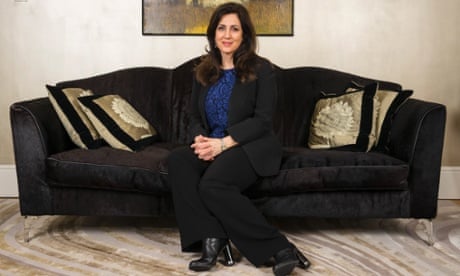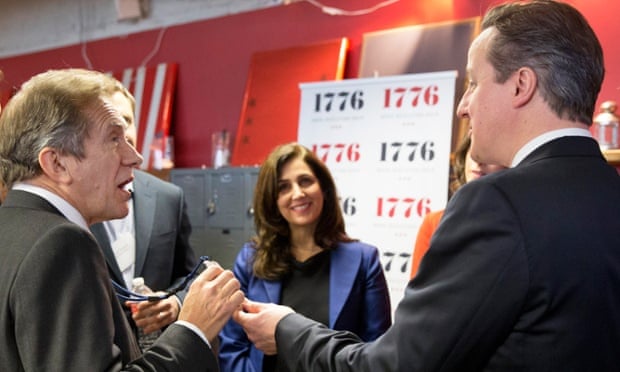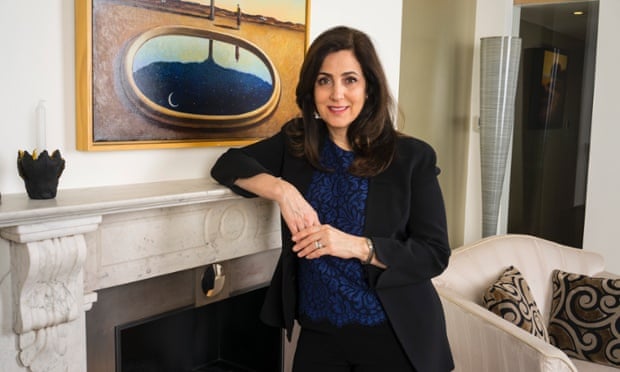
Imagine, if you will, the offices of a fashionable digital business. The rows of gleaming Apple computers. The ping pong tables. The brightly coloured designer furniture. Now scrub it from your mind and imagine the total opposite of that, and you may come up with something like the wood-panelled, burgundy-carpeted tearoom at the House of Lords where I end up meeting Joanna Shields.
Because Shields, otherwise known as Baroness Shields of Maida Vale, is the oddest of combinations: a highly successful American businesswoman and a peer of the British realm (she holds dual nationality). She was the European managing director for Google before leaving to go to the early but short-lived social media site Bebo, and from there went on to be Facebook’s MD for Europe, the Middle East and Africa. She was featured in former boss Sheryl Sandberg’s book, Lean In, and then, in an unexpected move, became the CEO (now chair) of Tech City, the government-backed body charged with encouraging growth in the digital economy, a digital adviser to David Cameron, and, in September last year, a Baroness.
Facebook must be one of the most youthful, dynamic places to work in the world. And you left it to join the House of Lords which must be one of the most antiquated. What were you thinking?
It’s been my life’s dream. I won a contest when I was a kid: I wrote an essay and won a trip to Washington. I always wanted to be in government.
But aren’t you in the wrong government, according to that dream?
No, actually not because I’m also British. I’m a dual citizen. I’ve been living here for 15 years. It’s my home. London is the greatest city in the world, by far. It’s this gateway to the world. I came here as a business person, and you could live in London and wake up and do work in Asia, and then by the time you finish your day, you’re talking to California. And I love the arts, I love theatre. I love the museums. It’s just a remarkable city.
When did you decide to become a British citizen?
In 2008. I knew I wasn’t going back, I wanted to stay. I was one of the first people to do the citizenship test. I’m one of those people who don’t want to get anything wrong, so I stayed up all night obsessed, studying. And I remember turning it in and saying to this Russian girl who was there, “How did you do?” And she goes, “I think I aced it.” And I said, “Yeah, me too.” And then the guy in the back said, “You both did. Neither one of you missed anything.” It was quite funny.
Have you ever come second at anything?
Of course. I don’t like to lose, though. Who does? But back to your question about the House of Lords, it’s just a real privilege to be here with these people who have all this amazing life experience.
Is that a polite way of saying they’re quite old?
No, not at all. And you know, I’ll be 52, I’m not the youngest. People take it very seriously. They work really hard.
So, when you explain about the House of Lords to your friends back in America, and say there are these hereditary peers who are basically born to rule, how does that go down?
Americans love history, and they love traditions. They think it’s kind of cool.

If the Conservatives win the election, would being a minister in the new government be something that interested you?
I have not been asked. It’s too early for that. I want to work hard and do as much as I can. Digital is so important to everything. I love that I can bring that to the table when it matters. I’m sorry I’m so optimistic, but I’m a really optimistic person.
Tech City launched something called Tech Nation this week. Can you explain what that is?
We looked at all sorts of data sources, from government and so on, and have done a complete state-of-the-tech-industry report for the UK.
And what headlines have come out of that?
The cool thing is that when I joined Tech City as CEO and chair two and a half years ago, it was very clear that what we were doing for east London – in terms of supporting entrepreneurship and coming up with policies that enabled companies to thrive and grow – we needed to do for the whole country. So at that point, Tech City became Tech City UK. We started creating national programmes to support growth.
Doesn’t the name Tech City, though, mislead people? Tech City, in most people’s minds, is in east London.
That’s just one initiative, but it turns out every city has a thriving tech industry. There are 21 clusters that we profiled, all in their own right really strong digital clusters. Tech and digital business is the fastest growing sector of the economy – and 74% of those businesses are located outside of London.
Is this the normal thing whereby London gets all the attention at the expense of the rest of the country?
Well, that’s what we’re trying to do: shine the spotlight on the whole country. It took us a year. It’s been a long project. We’re a very tiny team.
The big giant Tech City is manned by just 12 people?
This is one of the criticisms that was levelled at Tech City, certainly in the early days, that it was just a marketing gimmick and an example of politicians jumping on a bandwagon. There was a startup cluster in Silicon Roundabout and Tech City was created as a means of trying to grab the glory for political ends. That’s kind of unfortunate, because really what was happening was that at the height of the recession these green shoots were spotted in east London and it was a case of saying, let’s look at it, figure out what’s going on, and see how we can support it. And this was very smart, you can’t deny it. A report from Boston Consulting Group said that our internet economy is 12.4% of our GDP and that there are 1.46 million people employed in the tech sector, and these are mostly new jobs. It’s huge.
You’re now Baroness of Maida Vale but you were brought up in a small industrial town in Pennsylvania, one of five children. You sound like the heroine of a Bruce Springsteen song.
Oh, Bruce Springsteen was big where I grew up. He was the Boss. I know every word to every song he ever wrote.
What do your family make of your success?
My parents came to my introduction here at the House of Lords. My family are all entrepreneurs. They all own small businesses. They all have this thing of don’t take yourself too seriously.

You wrote a very moving article last year about your experience of being bullied as a teenager…
Yeah, I had a rough time. I grew up different. I was always slightly sticking out. I didn’t quite fit. I always wanted to travel and see the world, I had all these ideas… I was a little quirky. I probably drew attention to myself. I had a really hard time. I didn’t go to school for a year. I had physical abuse, mental abuse… it was horrendous.
Does that still inform you now?
Absolutely. Over the years it made me choose friendships wisely and really carefully. I remember sitting in a group of girls at university and being quite emotional because I was laughing for the first time. I was actually enjoying myself. That was quite hard. But now those two girls, they’re the best friends on earth. So, from that really dark place I found great friendships.
Business can’t be an easy place to be if your feelings get hurt and you don’t like bullying cultures. What drove you towards it?
I was interested in technology originally. Business was kind of an afterthought. It was more about building products to me.
Do you get fed up being asked about being a woman in business? Or, do you think it’s necessary to cheerlead for the next generation?
I feel a certain responsibility. I think it was Jack Lemmon who said, “If you make it, you have to send the elevator back down.”
You took only five days’ maternity leave when you had your son. Is that an example of the hard choices women have to make to have your sort of career?
That was really hard. But I was chief executive of a company, we had just raised some money, and the board was like, “You’re having a baby?” They took a chance on me, and I wanted to make sure that I didn’t let them down.
You come across as very unmacho. Has being a woman helped your career in any way? You’re very different to most men in corporate life.
I think a woman at the top of her game is the best. Women in general have more EQ [emotional intelligence], they understand the family balance, can tell when someone needs a break – we get it. I think in some sense that’s an advantage, but it is hard to be the only woman in a room sometimes. But technology is becoming more interesting and more appealing to women.
But now you’ve entered a profession that has even fewer women in it.
I don’t know – I was looking around in a meeting today thinking, Wow, there are some powerful women here. In cabinet there’s Nicky Morgan, Justine Greening , Elizabeth Truss and Theresa May – oh my gosh, she’s amazing
Facebook paid something like £200,000 in tax on more than £200m profit in Britain when you were in charge. Now you’ve entered politics, now you’ve seen that taxes are really necessary in terms of running the country, has your view of this changed?
First of all, I pay all taxes in both countries. I personally always pay my tax.
Doesn’t that make it more annoying then that companies don’t?
Every US technology company has deployed the same tactic for internationalisation for the past 30 years. But it’s changing. Everybody has complained about it, but this government has changed it. When we had the stewardship over the G8, we talked about tax and transparency. The OECD started this process, and it changed.
So, tell me, your previous boss was Mark Zuckerberg and now it’s David Cameron… any similarities?
They both work incredibly hard, they’re both incredibly passionate about what they do.
They’re both good at chillaxing? That’s what David Cameron once said.
I just see them as two incredibly dedicated people. Mark was amazing to work for – such a visionary and such immense talent. A very quiet leader. Both of them are quiet leaders. Quiet, determined, thoughtful leaders.